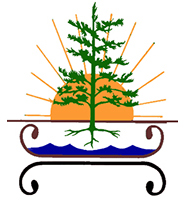
The Consensual Decision-Making Process
Consensus:
- General agreement;
- Judgement arrived at by most of those concerned;
- Group solidarity in sentiment and belief.
Goal: To make a decision that is in the best interests of all the People. Consensus does not mean that all agree, but that all understand the decisions.
Approach: In entering the Consensual Decision-Making Process, whatever ideas are put into the process, the needs and attitudes of each are considered to complement the decision.
Also, individuals have a duty to be directly involved, and to bring their ideas into the discussion within their group.
The final decision may be fully satisfactory to some, satisfactory to others, relatively satisfactory to most, and possibly un-satisfactory to someone. This is a slow and careful process requiring the full understanding by each individual, not a decision made by a "leader," but it will be a decision that reflects elements from each group.
Roles: Within any collective group of People, whether it is a Family, Clan, Band, Tribe, Nation, or Confederation, equatable representation must be given to all groups. Spokes people are usually chosen within the smallest division of the greater group. This may be the male or female head of a family, clan speaker, matriarch, elder, band chief, or whatever leader or spokesperson is chosen to speak for each group.
An impartial Facilitator should be chosen from the greater group gathered. This person is selected because of their ability and respect as an elder or leader. Their role is to provide control and order to assure that collective rational thought and behavior are followed to come to an agreement.
Process: The smallest groups within the larger group of people will deliberate on an issue or matter. The leader of each smaller group reports their decision to the Facilitator. If the smaller groups disagree, or there is an error or irregular proceeding the Facilitator will ask that they deliberate again. This process may need to be repeated until the Facilitator believes that all understand and the issue is agreed upon.
Three Truths: When an issue is discussed, the groups consider the good and bad parts of the issue. The following "Three Truths" must be met for consensus:
- Peace - Does it preserve the peace that is already established?
- Righteousness - Is it morally correct?
- Power - Does it preserve the present and future integrity of the group?
- Present - What does it do for the present generation?
- Future - How does it affect the future seven generations from now? The decisions made today must benefit all the people from the present to the seven generations into the future.
Deliberations: Persons are asked throughout the process if they fully understand. If not, the process stops until this is accomplished. One cannot simply be stubborn and refuse to understand as they will be questioned. Each must follow the Truths of Peace, Righteousness and Power at all times.
Every person has a responsibility to expand and exercise their minds. The forces of life have given the human being the potential to use the mind to create a better life through Peace, Righteousness and Power.
In the Decision-Making Process
- All opinions have to be considered;
- All must be completely reasonable;
- All should come with an open mind;
- All must fully understand the other's viewpoint;
- Each participant cannot repeat a position once it has been fully explained and understood;
- A person who does not agree with the views stated must fully explain their dissenting views;
- No one can impose their will nor make a decision for another;
- All must understand the viewpoint and agree of their own free will;
- If there is no consensus, the consensus is to retain the existing position on the issue.
Cowasuck Band of the Pennacook - Abenaki People
Alton, New Hampshire 03809-0052
Phone: 603-776-1090
Email: cowasuck@tds.net
Government
Government Structure
Consensual Decision-Making Process
Citizenship & Membership Requirements
Open Letter - Membership in the Band
Goals Statement
Constitution
Language & Traditions
Homelands & People
Traditional Lifestyle
Abenaki Language
French Jesuit Missions